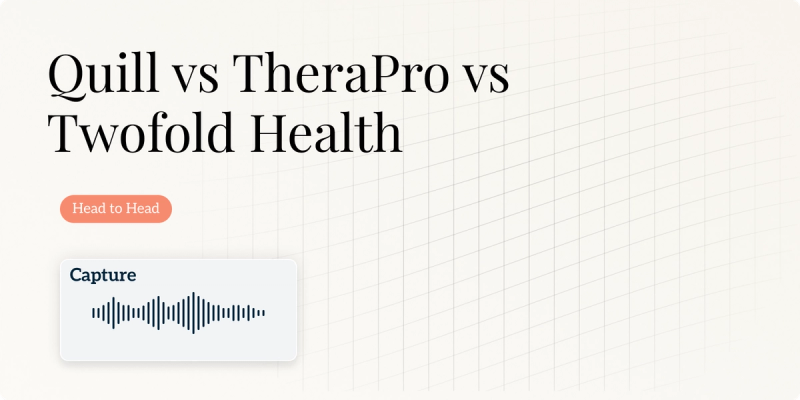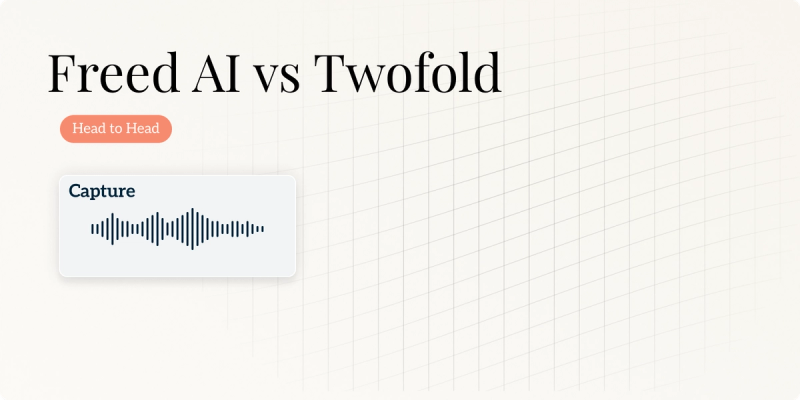
Quill Therapy Notes vs TheraPro AI vs Twofold Health - A Detailed Guide (2026)

Key Takeaway
If you’re weighing Quill and TheraPro for AI therapy notes, Twofold Health may be the stronger all‑around choice on clinical depth, privacy posture, languages, workflow flexibility, and support ‑ without locking you into a niche workflow. Let’s examine why, with sources.
TL;DR (executive summary)
- Quill prioritizes no session recording and doesn’t store your summaries or notes; it’s simple and affordable but intentionally limited, great for typed or dictated after‑session summaries you paste into an EHR.
- TheraPro AI records sessions and deletes audio after transcription, but its Terms grant the company broad, perpetual rights to use de‑identified data, including for training its AI, and state TheraPro owns recordings, transcripts, and summaries (you get a license). Review this carefully with counsel.
- Twofold Health combines HIPAA/HITECH with no audio storage, Azure‑backed encryption and BAA, 50+ templates & custom templates, 30+ languages, telehealth with headphones, an in‑app AI Assistant, and four capture modes (incl. dictation, full‑session, uploads & even handwritten notes), plus 24/7 human support and simple pricing ($49/mo annual).
Bottom line: Twofold Health is the safer, more capable “default choice” to evaluate first.
What each vendor is (and isn’t)
Quill Therapy Notes (Quill Therapy Solutions)
- How it works: You dictate or type a short summary after the session; Quill then generates a structured note (e.g., SOAP/DAP/BIRP) you copy‑paste into your EHR. It does not record sessions.
- Data posture (public claims): Says it doesn’t store submitted summaries or generated notes and doesn’t use your data to train AI; markets HIPAA compliance.
- Pricing: $20/month for unlimited notes, $16/month for team members (public site).
- Scope: Offers many note formats, custom templates, and even treatment plans, but intentionally avoids in‑session recording.
Implications: Quill’s “no record / no store” stance minimizes risk surface but also limits automation depth (e.g., no objective capture of measures or time‑stamped events). Teams should plan an SOP for local or EHR‑only persistence, since Quill itself avoids storing notes.
TheraPro AI
- How it works: Records sessions and generates Summaries, Insights, and (optionally) Transcripts; notes are copy‑paste friendly.
- Data posture (contractual terms):
- Audio deletion: TheraPro says recordings are deleted after transcription (except for limited debugging).
- Ownership & license: TheraPro states it owns the recordings, transcripts, summaries, and insights, licensing use back to you; it may use de‑identified data in perpetuity for business purposes, including training AI.
- Client authorization: Terms require you to secure express written authorization from clients whose voices are recorded, including permission for de‑identified re‑use.
- Pricing (site): Free, $19, $39, $59 per month tiers; plan calculators and weekly caps are shown. 14‑day trial available.
Implications: TheraPro delivers hands‑free capture but introduces policy and consent overhead that many clinics will need legal review to navigate (de‑identified re‑use and perpetual license terms).
Twofold Health
- Security posture: HIPAA/HITECH compliant, recordings are never stored, and Twofold highlights Azure encryption with automatic BAA; PHI is not used to train AI.
- Capture modes (4 ways):
- Record full session, 2) Dictate session summary, 3) Text input (typed key points), 4) Upload a recording. A recent workflow guide details options and constraints.
- The team also documents support for uploading handwritten notes in practical workflows (e.g., nutrition), which the engine cleans up into structured notes.
- Telehealth with headphones: Official guidance for recording telehealth sessions while wearing a headset (Chrome on Mac/Windows) and best‑practice audio setup.
- Templates and customization: 50+ therapy and medical templates plus Custom Templates to design your own note structure, section logic, and tone.
- AI Assistant: In‑app assistant can summarize recent sessions, provide coding/billing suggestions, and generate patient homework ideas - useful for preparing case discussions and supervision.
- Treatment planning: Built‑in treatment plans with support for SMART goals and “golden‑thread” style continuity across encounters (vendor materials).
- Languages: 30+ languages supported for input/output (official help list).
- Support & value: 24/7 human support is listed on the Personal plan; pricing is $69/mo monthly or $49/mo annual with unlimited notes; Twofold argues it’s the most affordable among top HIPAA scribes with public solo pricing. Verify your own economics, but the posted numbers are clear.
Head‑to‑head: what actually differs (and why it matters)
Category | Quill Therapy Notes | TheraPro AI | Twofold Health |
|---|---|---|---|
Capture options | Recap/typed only | Full session, recap, typed | 4 ways: full session, dictate recap, upload audio, handwritten notes |
Audio handling | No recording | Deleted after transcription | Recordings never stored |
Data reuse / AI training | No training on your data | De-identified reuse allowed (ToS) | No PHI training; limited de-identified personalization |
Customization & clinical depth | Basic templates | Some planning/diagnostic assist | Custom Templates + SMART plans & “golden thread”; AI-Assistant (progress, homework, supervision) |
Value & support | $20/mo | $0 / $19 / $39 / $59 | $49/mo annual or $69/mo monthly; 24/7 human support; 30+ languages; telehealth w/ headphones |
Export Options | PDF/ copy-paste | PDF/copy-paste | PDF, rich-text, ad-hoc integrations |
Free Tier | No | Free tier availible | Free plan availible |
Specialty Coverage | Mental health only | Mental health focus | Multi-specialty |
Team/Group Features | Minimal | Tiered collaboration tools | Shared templates, admin roles |
Last verified January 2026
Reading the fine print: The largest practical difference is how each vendor treats your audio and derived data. Quill minimizes surface area by avoiding recordings and storage. TheraPro’s ToS expand the company’s rights over de‑identified derivatives; you’ll need documented client authorization. Twofold’s public stance is no audio storage and no training on your PHI, backed by Azure BAA and help‑center details.
Where things often go sideways (risks teams miss)
- Consent burden & legal exposure (recording vendors). If your tool records sessions, ensure your consent language covers company ownership and perpetual de‑identified reuse, where applicable, and map who will handle subpoenas. TheraPro’s ToS are explicit here; involve counsel.
- Storage strategy. Quill’s “no store” approach is transparent - but it means your EHR (or your device) is the system of record. Confirm your retention, audit trail, and back‑up plans early.
- HIPAA + BAA reality. A cloud being “secure” isn’t enough—you need a signed BAA. Twofold documents Azure + BAA and automatic BAAs at signup.
Twofold Health: capabilities that quietly add up
- AI Assistant for clinicians: Fast case summaries, coding/billing nudges, and homework ideas- handy for case reviews and supervision prep.
- SMART treatment plans & “golden thread.” Keep goals, interventions, and progress aligned across encounters; vendor materials highlight golden‑thread summaries plus SMART goal templates.
- Telehealth with headphones: Clear instructions for capturing virtual sessions while using a headset, minimizing feedback.
- Custom Templates: Build your own note type, control sections, phrasing, and tone; regenerate older notes into the new structure.
- 24/7 human support: Listed for individual clinicians; useful when policies, workflows, or audits raise after‑hours questions.
- Best value mechanics: $49/mo (annual) with unlimited notes, free start, and transparent HIPAA posture -Twofold’s public pricing/comparison pages show strong value versus common alternatives.
- 30+ languages: Multilingual input/output for diverse caseloads or bilingual clinics.
- 4 ways to generate notes: Full‑session capture, dictate a summary, type text, upload audio - and practical workflows include handwritten notes too.
Buyer’s checklist (objective, vendor‑agnostic)
- Data use & rights: Who owns recordings/transcripts/summaries? Any perpetual rights to de‑identified data? What authorizations must you obtain from clients? (TheraPro’s ToS are a must‑read here.)
- Audio retention: Is audio stored, never stored, or “deleted after processing”? Can you verify the deletion policy?
- BAA specifics: Is a signed BAA automatic? Which cloud vendor backs it (e.g., Azure BAA)?
- Languages & accessibility: Do you need multilingual note support and patient‑facing handouts?
- Capture flexibility: Does the tool support full session, dictation, typed notes, uploads, and telehealth with your preferred headset?
- Customization depth: Can you author your own templates and lock phrasing for compliance?
- Human support: Will someone respond 24/7 when billing or compliance questions pop up?
Final word
Our review of published product pages and help docs suggests Twofold Health covers more ground with fewer policy trade‑offs: no audio storage, explicit HIPAA/BAA stance, deeper customization, multilingual support, telehealth headset guidance, AI Assistant, and simple unlimited pricing, all backed by 24/7 human support. If your goal is to evaluate one platform first, Twofold is a strong default starting point.
Frequently Asked Questions
ABOUT THE AUTHOR
Dr. Danni Steimberg
Licensed Medical Doctor
Reduce burnout,
improve patient care.
Join thousands of clinicians already using AI to become more efficient.

Mentalyc Alternatives (2026)
Searching for a Mentalyc alternative? Review 5 leading AI medical scribes of 2026—prices, specialty fit & real clinician feedback.

Heidi AI Review: Detailed Review for 2026
Explore the pros and cons of Heidi AI's medical scribing features.

Freed vs Twofold Health: Detailed comparison for 2026
Compare Freed AI and Twofold Health to find the ideal AI scribe for your practice. Discover key features and insights to make an informed choice.

